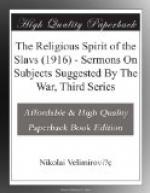CHRISTIANITY AND CIVILISATION.
The following is the Slav point of view: Christianity came into the world, not in order to inaugurate a new civilisation, but to infuse a new religious spirit, to clear and purify the human conscience. A perfect Christian spirit can exist quite outside civilisation as well as in the midst of the most complicated civilisation. A Christian negro, in his nudity, picking up dates under a palm tree, can be as good and saintly a man as any business man from the Strand in London or from the Fifth Avenue in New York. And, on the contrary, the most civilised men, like Bismarck and Nietzsche can be of a much more anti-Christian spirit than any primitive human creature in Central Africa or Siberia. Many civilisations have been created without Christianity. You cannot say that Christian London is a more perfect and beautiful city than Pagan Rome or Mohammedan Cordova were. But you may perhaps say that the spirit of London is more sublime and humane, more good and saintly, than the spirit of Rome and Cordova. Well, it is the spirit which regards Christianity, and nothing else. Civilisation is only an occasion for Christianity to prove its spirit. It is an occasion of suffering, and also of corruption. In both cases Christianity has to be tested. Christianity has to fight against a Pagan civilisation as well as a Pagan barbarism. It is sometimes harder for the Christian spirit to fight against the first than against the second form of Paganism. It was easier for the Christian mission to Christianise barbarous Africa than cultivated Rome. And imagine how much it will cost till Bismarckian and Nietzschean Germany “changes her spirit” as Sienkiewicz foretold.




